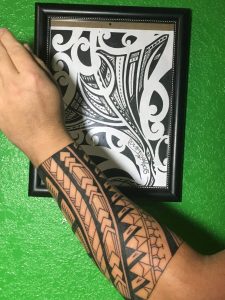
TUSCALOOSA, Ala. — Tattoos boost the skin’s immune response to injury and convey the person’s vitality, according to a study in American Samoa.
“The stress of each tattoo seems to prepare the body for vigilance,” said Dr. Christopher Lynn, associate professor of anthropology at The University of Alabama.
Lynn led a study in July 2017 of 25 adults receiving tattoos in American Samoa, where tattoos can be part of a cultural identity. Researchers measured biomarkers found in saliva that rise in response to bodily stress and interact with immune response. The team recorded levels before and after receiving a tattoo.
The study found that people with more tattoos had higher baseline immune levels than people with fewer or no tattoos. Further, people with more tattoos experienced better immune response to receiving a new tattoo. The results suggest those with tattoos have a better immune response to attacks on the skin or that come through the skin, according to a paper published in American Journal of Human Biology.
The findings complement a previous study led by Lynn that showed receiving multiple tattoos can strengthen your immunological responses.
“Tattoos are a window into the human experience from cultural, biological, linguistic and archaeological perspectives,” Lynn said. “Even in the modern environment with improved health care, tattoos may up the ante by artificially injuring the body to demonstrate health.”
While it’s not clear tattoos make a clinical difference to a person’s health, they do demonstrate toughness and likely gird the skin for future attacks, according to Lynn’s work.
“If adaptation in the skin is occurring, it is likely adaptation to a similar stressor, so we assume it generalizes to other dermal stressors, but we do not know for sure,” he said.
Contributions from the paper come from co-authors from the University of North Carolina Wilmington, the American Samoa Historic Preservation Office and three tattoo artists on the island.
Contact
Adam Jones, UA communications, 205-348-4328, adam.jones@ua.edu
Source
Dr. Christopher Lynn, cdlynn@ua.edu
